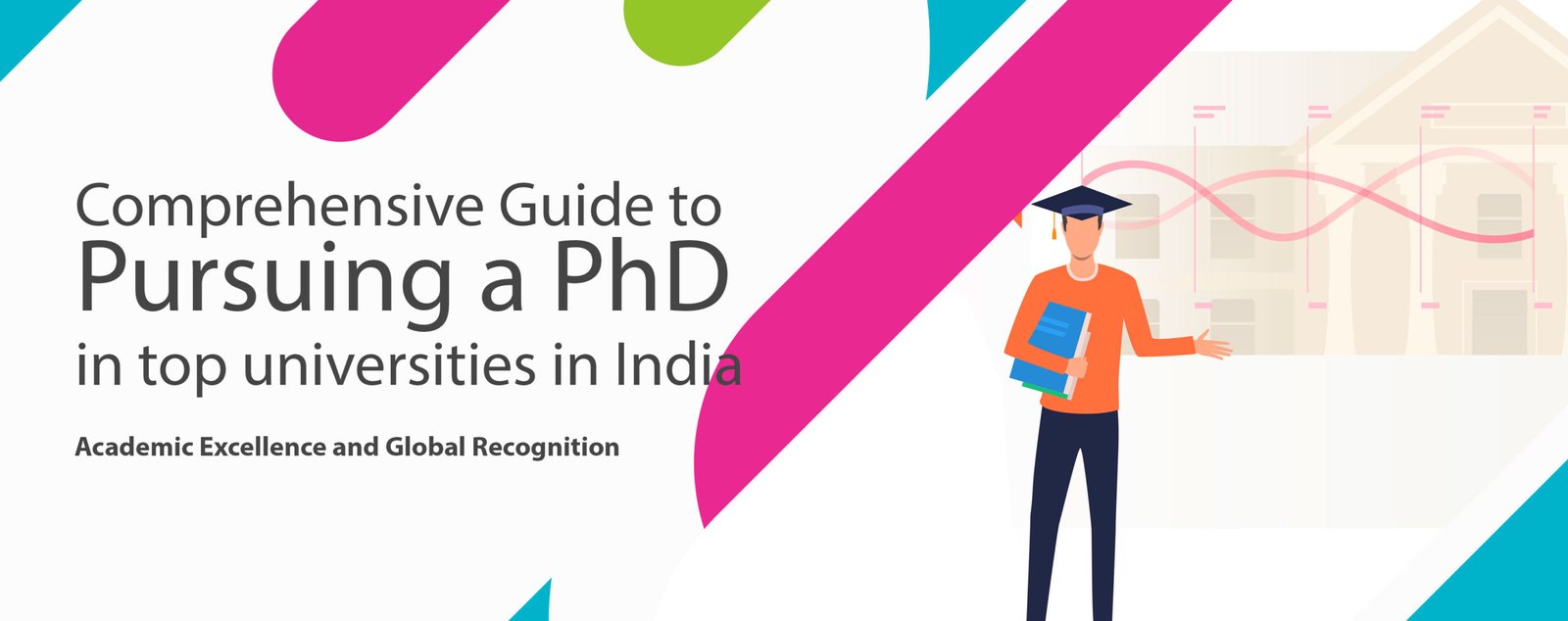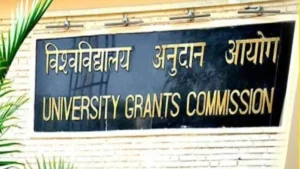यूजीसी से दिल्ली के आठ विश्वविद्यालय फर्जी घोषित, फिर भी...
Read More
Introduction
To get a PhD is an advanced academic process which gives a person a great amount of knowledge and marks him or her as the best scholar. It is a voyage, which requires commitment, love and the ability to explore further at any cost. Choosing the right university is very important especially for scholars as it will shape the kind of future research and job opportunities a scholar is going to have. India has a strong academic background and a plethora of research opportunities for higher education and, therefore, pursuing a PhD in India is highly feasible. This guide will take you through all the information that you may need about how to go about doing a PhD in top universities in India.
Why Pursue a PhD in India?
• Academic Excellence and Global Recognition
India stands out for its prestigious institutions, which are globally recognized for their commitment to excellence in education and research. In general, the Pattern Recognition System of India can boast many first-class Universities like the Indian Institutes of Technology (IITs) and the Indian Institute of Science (IISc) which always remain in the leading ranks of the academic ratings of the world. Besides boosting your academic portfolio, the PhD obtained from these establishments also creates an opportunity to work in any part of the world.
• Availability of Specialized Research Opportunities
Top universities of India provide human resources with numerous options of specialization in their research in the field of technology to the historical background. The nature of the country’s academic market means that scholars receive the freedom to niche themselves to perfectly fit their research interests.
• Cost-Effectiveness Compared to Other Countries
Cost-effectiveness is one of the main benefits of pursuing a PhD in India. India is a popular destination for both domestic and foreign students since it has considerably less living and educational costs than Western nations.
Eligibility Criteria
• Basic Academic Qualifications
Students who really want to do PhD in India, firstly need to have a post graduate degree in any field. Some universities also admit students who have only a Bachelor’s degree but the candidate should have proven academic performance and research expertise.
• Basic Academic Qualifications
Students who really want to do PhD in India, firstly need to have a post graduate degree in any field. Some universities also admit students who have only a Bachelor’s degree but the candidate should have proven academic performance and research expertise.
• Entrance Exams
Success in an entrance examination is equally important during the admission to the PhD program. Standards of qualification and Entry tests like Graduate Aptitude Test in Engineering (GATE), National Eligibility Test (NET) etc. Most of the Universities in India demand GATE and NET for admission to PhD programmes. Some universities may also have their test that students are to take before they can be offered admission into any university of their choice.
• Additional Requirements
Besides meeting certain educational requirements, some universities may have a requirement that candidates should have prior research experience, publications or work experience in certain well defined fields.
Top Universities in India for PhD
Vikrant University
Admissions eligibility criteria for Vikrant University’s are crafted to assure that only the most deserving student can get accepted. It’s compulsory for anyone considering a Ph.D. at Vikrant University to be know about the basic criteria for the degree. The minimum eligibility percentage at Vikrant University is 55%, and applicants must hold a Master’s degree in a relevant discipline.
Gyanveer University
Gyanveer University aspires to be one of the most vibrant and dynamic University of India. University will actively promote and preserve moral values, ethics in higher education along with focus on high quality teaching across disciplines with significant contribution to research. Courses offered are in accordance with socio-economic scenario of the state.
Eklavya University
Eklavya University is committed to nurturing achievers in life and careers through a value based, industry relevant and future ready educational program. Eklavya University is a career-driven Private University focused on innovation, interdisciplinary skill based learning, quality placements, and exemplary faculty.
Sam Global University
The university is established by Shri Guru HarGovind Society which is providing quality education since last sixty Years from schooling to post graduate level. SAM Global University, the Top Private University in Bhopal, Madhya Pradesh, is synonymous with the pinnacle of global education. It sets the benchmarks for excellence by incorporating the finest practices, theories, resources, and standards from around the world.
Other Notable Universities
Some other well known universities offering PhD education in India are Tata Institute of Fundamental Research (TIFR), All India Institute of Medical Science (AIIMS) and National Institute of Technology (NITs) each having their own research focus.
Phd Application Process
Step-by-Step Guide Phd Application Process
- Research Potential Universities: Determine which universities will best suit your research interests.
- Prepare Your Documents: Collect all relevant documents, such as academic transcripts, research projects, and recommendation letters..
- Apply for Entrance Exams: Register and prepare for required entry examinations such as GATE, NET, and university-specific tests.
- Submit Your Application: Complete the online application process, ensuring that all information is correct and complete.
- Attend Interviews: Candidates who are shortlisted may be invited for interviews or presentations to examine their research ability.
Key Deadlines
The application dates for each university differ, and so it’s important to confirm these well in advance to make sure you don’t miss out.
How to Prepare a Strong Research Proposal
Your research proposal is one of the important parts of documents for applying for a PhD program. Research proposal should opt for a clear presentation of your goals in the research study, the approach used and the contribution of your own research to the existing knowledge. Do not forget to show how you are familiar with the area of study and where your research fits with the university’s niches.
Phd Entrance Exams
Overview of Major Entrance Exams
- GATE: Primarily for engineering and technology disciplines.
- NET: Required for teaching and research positions in Indian universities.
- JRF: Junior Research Fellowship exams for those seeking research funding.
Tips for Preparing and Succeeding
- Understand the Syllabus: Familiarize yourself with the exam syllabus and pattern.
- Create a Study Schedule: Allocate sufficient time for each subject and stick to a disciplined study routine.
- Practice Previous Papers: Solve previous years’ question papers to get a feel of the exam and improve your time management.
The major entrance exams for phd, we present a brief overview of the major common entrance examinations.
GATE: Largely for the engineering and technology specialty areas.
NET: Essential for appointment on permanent basis to teach and for carrying out research in universities of India.
JRF: exam for Junior Research Fellowship for researchers who would like to apply for research grants.
Strategies on How to Prepare for and to Excel in
- Understand the Syllabus: It is also important to become acquainted with the format of the exam, the pattern to be followed and the syllabi being followed.
- Create a Study Schedule: Plan one’s day and ensure that enough time has been dedicated to each subject and avoid Procrastination.
- Practice Previous Papers: Time management is a crucial area that needs to be worked on; try to work on previous years’ question papers to gauge the experience of the exam.
Available Scholarships and Fellowships
There are several scholarships and fellowships for the Indian PhD students like UGC NET JRF, CSIR Fellowships and INSPIRE Scholarships. These sponsor the candidates in a way that they are able to devote their time towards research.
Government and Institutional Funding
The Indian government as well as other related institutions provide funds and grants that are awarded to research. These research features, such as the Prime Minister’s Research Fellowship (PMRF), are precisely intended to support research in current areas of technology and sciences.
Tips for Securing Financial Aid
Phd Research Opportunities and Facilities

Overview of Research Facilities
Indian premier Universities are already endowed with full-fledged infrastructural requirements such as research laboratory, library, and other necessary equipment resources. These resources are very important in ensuring the quality of the work done comes up with quality research.
Collaborations with International Institutions
Most of the Indian universities have developed partnerships with international universities so that students and researchers can undertake joint research work and projects, undertake exchange programmes or obtain global exposure.
Opportunities for Interdisciplinary Research
The focus on multi-disciplinary research creates an opportunity for the students to acquire knowledge from other fields while pursuing their PhD. This strategy facilitates the development of innovations and wider societal benefits from research.
Life as a PhD Student in India
Academic Culture and Expectations
Scholars organize the academic culture in India with high intensity and focus on research productivity and academicianship. It was expected from the PhD students to participate through publication, conferences and other collaborations.
Balancing Research with Personal Life
As with every other aspect of life, managing a PhD research project alongside other responsibilities in one’s day-to-day life can be very difficult at times. It is important to learn how to manage time properly and set discover proper goals to be able to keep this balance.
Networking and Professional Growth
There is huge interaction among students, faculty members and industry specialists through conferences, workshops and seminars. These interactions are essential for personal development, as well as making plans for the subsequent employment.

Career Opportunities After PhD
Academic Careers
Usually, scholars who have completed their PhD are involved in an academic profession as university teachers or lecturers and researchers in universities and research stations.
Industry Roles
People with PhDs are desired in all sectors of the economy especially in research and development, consulting and in any specialized position.
Entrepreneurship and Start-Ups
Today there is an increasing trend where most of the PhD holders are engaging in business by creating new products, technologies or business services out of their research findings.
Phd Challenges and How to Overcome Them
Common Challenges
There are flip side to attending PhD such as research stress, time crunch and at times feeling of loneliness.
Tips for Maintaining Motivation
Thus, it becomes really important to remain motivated when doing research for a PhD. Coping strategies are such as; having realistic targets, seeking help from others, friends and mentors, observing work-life balance.
Dealing with Academic Pressure and Mental Health
Stigma and negative attitudes remain major barriers to the effective management of mental illnesses and therefore a need to act as a preventive measure to such illnesses. Students should also know that their Universities often offer counseling services and should not shy from seeking help in case they are overwhelmed.
Conclusion
Anyway, the experience of getting a PhD from the leading Indian universities is a difficult quest but very worth it. With proper choice of the university, entrance examinations preparation, scholarships and grants for international students, and concentration of aims and objectives in your research you can fully benefit from it. On this journey that you are about to start in this academic environment, you must know that determination, curiosity, and passion are your main weapons.
UGC Releases Important Notice For Students, Warns Against Fake Universities Awarding Degrees
UGC Releases Important Notice For Students, Warns Against Fake Universities...
Read MoreNAAC: What about accreditation of accreditors?
NAAC: What about accreditation of accreditors? The NAAC is in...
Read MoreHow to Prepare for a PhD Interview Without a Specific Research Topic?
How to Prepare for a PhD Interview Without a Specific...
Read More


